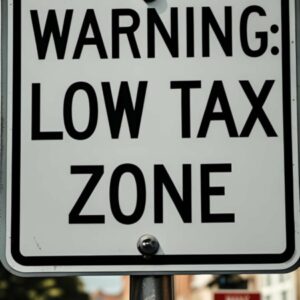 … in a state you might not expect. This is a state with the highest property values in the nation, so it’s extra surprising that this state also has the lowest effective property tax rate nationally. If you guessed California, you’re 100% wrong! We’re talking about Hawai’i, where the average effective property tax rate is a microscopic .27%. This pales in comparison to the state with the highest property tax rate, which is New Jersey, at 2.33%. If you’re in Jersey, and have just now decided to list your home and move to Hawai’i, you might want to think again; the average home price in Jersey is $550,000, while in Hawai’i, it’s $840,000, according to Zillow.
… in a state you might not expect. This is a state with the highest property values in the nation, so it’s extra surprising that this state also has the lowest effective property tax rate nationally. If you guessed California, you’re 100% wrong! We’re talking about Hawai’i, where the average effective property tax rate is a microscopic .27%. This pales in comparison to the state with the highest property tax rate, which is New Jersey, at 2.33%. If you’re in Jersey, and have just now decided to list your home and move to Hawai’i, you might want to think again; the average home price in Jersey is $550,000, while in Hawai’i, it’s $840,000, according to Zillow.
So how does Hawai’i stomach missing out on so much property tax revenue? Part of the answer lies in the state’s tourism taxes; for example, Hawai’i’s hotel taxes are some of the highest in the nation, which has recently become controversial. The tax on the average hotel stay in Hawai’i is 19%, which includes a 10.25% statewide transient accommodations tax (TAT), as well as various surcharges and excise taxes that vary by county.
This kind of tax would absolutely destroy the tourism industry in most states, but Hawai’i is different. Every state is beautiful and special in its own way, but let’s be honest, nothing in the U.S. compares to Hawai’i.
Though everyone complains about taxes, Hawai’i’s taxation that focuses more on tourists than on property seems like a relatively effective strategy, at least in theory. People generally expect to spend more while on vacation, since vacations are a non-necessary, luxury expense. Property taxes, however, feel like much less of a choice than going on an expensive vacation. Crucially, it is far easier to levy higher taxes when those taxes focus on tourists who don’t vote in the state.
However, Hawai’i’s taxation strategy has suddenly ignited legal controversy after the state passed the nation’s first climate impact hotel tax, which is a .75% tax on transient accommodations, and will bring the total transient accommodations tax (TAT) to 11%.  On its face, this new tax makes sense; the state has suffered catastrophic fires, and the tourism industry is a major threat to its natural resources. A green tax seems like a good way to counteract the effects of tourism. However, part of this legislation includes levying this 11% tax on cruise ships, not just on hotels, and is based on how many passengers the cruise ship has aboard. This is the first time a state hotel tax has ever been applied to cruise ships, and this tax is very likely to be ruled unconstitutional.
On its face, this new tax makes sense; the state has suffered catastrophic fires, and the tourism industry is a major threat to its natural resources. A green tax seems like a good way to counteract the effects of tourism. However, part of this legislation includes levying this 11% tax on cruise ships, not just on hotels, and is based on how many passengers the cruise ship has aboard. This is the first time a state hotel tax has ever been applied to cruise ships, and this tax is very likely to be ruled unconstitutional.
The U.S. Constitution specifically forbids state taxation of a ship’s capacity without the consent of Congress; only the Federal Government may levy a tax like this. This is outlined in the Tonnage Clause of the Constitution, which says “No state shall, without the Consent of Congress, lay any Duty of Tonnage….” In this case, “tonnage” does not refer to a ship’s weight, but to its capacity. This clause has historically been interpreted broadly as giving states no power whatsoever to levy a capacity-based tax on vessels involved in interstate commerce. Since interstate commerce on the ocean has been generally restricted to taxation only by the federal government, no state has ever exerted significant taxation authority over cruise ships. There is, however, a limited exception; no fees or taxes may be charged against any vessel in U.S. waters by a state, unless that fee is for services provided directly to the vessel itself. For example, a port fee that pays for maintaining a gangplank for the use of the vessel is constitutional, since it is not a tax on the ship’s capacity, does not involve a state regulating interstate commerce, and pays for state maintenance of the dock for the ship. However, a tax on cruise ships based on how many passengers they carry would likely be unconstitutional, since this involves a state exerting taxation authority over a ship’s capacity without the consent of the Federal Government.
Part of the reason that property taxes are so useful for local funding is because the federal government does not tax real estate directly; this authority is left to local governments. However, this taxing authority of local governments is limited; local governments do not have any authority to levy federal taxes. If Hawai’i’s new tax were only levied against tourists who actually disembarked from a cruise ship, there would likely be no constitutional objections; however, this new 11% tax is levied against the cruise ship itself, and is calculated per passenger, whether or not they disembark. It’s almost like a property tax levied by a state on housing that is under federal jurisdiction. 
I don’t necessarily think it’s always a bad idea to tax tourists, especially in a state like Hawai’i that has suffered so much recent devastation. However, I’m fascinated by how this 11% transient accommodation tax on cruise ships has made it all the way into law, when I can’t find a single argument explaining how it doesn’t violate the Constitution. That said, I’m not a lawyer or a legislator… I’m just a real estate licensee whose relevant credentials include having taken an Alaskan cruise once a few years ago.
https://news.bloombergtax.com/tax-insights-and-commentary/hawaiis-new-cruise-tax-is-entering-some-uncharted-legal-waters
https://www.hawaiinewsnow.com/2025/05/28/governor-signs-green-fee-into-law-tackle-climate-change/
https://www.travelmarketreport.com/destinations/articles/hawaiis-new-tourist-tax-green-fee-signed-into-law
https://www.birchhorton.com/blog/2018/12/federal-court-rules-on-the-constitutionality-of-passenger-fees-and-hints-as-to-acceptable-local-uses/
https://westwoodinsurance.com/news/10-most-expensive-states-to-buy-a-home/
https://beatofhawaii.com/industry-prepares-showdown-over-hawaiis-new-visitor-tax/
https://www.zillow.com/home-values/18/hi/
https://www.sfgate.com/hawaii/article/hawaii-more-expensive-tax-increase-20374119.php
https://www.travelmarketreport.com/cruises/articles/hawaiis-new-cruise-tax-could-cost-families-hundreds-faces-legal-battle
(866) 519-9597



